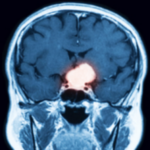 Brain cancer can go undetected for months – growing silently, until one day a person notices an increase in headaches or has a seizure unexpectedly.
Brain cancer can go undetected for months – growing silently, until one day a person notices an increase in headaches or has a seizure unexpectedly.
By that time, the tumor could have grown, spread, or become more difficult to treat.
That is why researchers continue to look for ways to detect brain cancer sooner. And this year, researchers have made at least two breakthroughs to help detect brain cancer sooner.
Blood Tests for Brain Cancer
In August, researchers at the University of Notre Dame, announced they created a fast, affordable blood test to diagnose glioblastoma, a fast-growing, incurable form of brain cancer in adults. The test – which detects biomarkers over-expressed in certain cancers like glioblastomas – can be completed in under an hour and could ultimately be used to detect other forms of brain cancer.
“Our technique is not specific to glioblastoma, but it was particularly appropriate to start with it because of how deadly it is and the lack of early screening tests available,” said Hsueh-Chia Chang, Bayer Professor of Chemical and Bio-molecular Engineering at Notre Dame and the lead author of the study published in Communications Biology .“Our hope is that if early detection is more feasible, then there is an increased chance of survival.”
And earlier this year, researchers in Great Britain announced another blood test that could also diagnose brain tumors. This test works by identifying tumor cells that have broken away from the tumor and can be found in the blood stream. The research is documented in the International Journal of Cancer.
According to Duke University School of Medicine, slow-growing brain tumors like astrocytoma’s can grow undetected for years. The same is true for meningiomas. But with glioblastomas symptoms can appear within three months.
Brain Cancer Symptoms
According to the American Cancer Society, the growth of the tumor and how it impinges on the brain leads to symptoms including headaches, nausea, blurred vision, issues with balance, personality changes, seizures or drowsiness.
Tumors in various parts of the brain can lead to other problems including issues with speech, numbness, trouble walking or weakness.
Types of Brain Tumors
And while there are about 130 different types of brain and central nervous system tumors according to the University of Pennsylvania the four most common types in adults include:
- Metastatic Tumors: A secondary tumor arising from somewhere else in the body.
- Meningioma: Which may or may not be benign that forms in the meninges, the membranes lining the skull and vertebral canal.
- Glioblastoma: The most common cancer that originates in the brain. It is also the deadliest. Survival rates are generally a year to 15 months.
- Astrocytoma: A primary brain tumor originating in the cerebrum. Astrocytoma has more positive survival rates. For patients between 20 and 44 with low-grade astrocytoma, the survival rate is around 68%. It is lower for older patients.
Brain Cancer Statistics
Last year more than 84,000 Americans were diagnosed with brain tumors, according to the National Brain Tumor Society. About 59,000 were benign, and 25,000 malignant.
The causes of brain tumors are not completely understood, according to the American Cancer Society. But there are some risk factors.
- Family history — It is considered rare for a brain tumor to be genetic, but if several members of your family are diagnosed with a brain tumor, talk to your doctor about being monitored closely.
- Age – Risk may increase with age.
- Race – Brain tumors are more common in Caucasians. But African Americans are more likely to get tumors called meningiomas.
- Chemical and radiation exposure can increase your chances of a brain tumor.
- A weakened immune system can also increase your risk.
If you notice any changes in headache frequency or develop one of the symptoms – see a doctor. While it is likely to not be a brain tumor, it is always worth ruling it out as a possibility.
Brain Cancer Treatment in Miami
Brain tumors are often treated with chemotherapy, radiation, targeted therapy, and surgery. Sometimes doctors use a combination of treatments to kill the cancer, but there is no single treatment. If your doctor recommends radiation, the experts at the CyberKnife Center of Miami can help.
CyberKnife uses targeted radiation to kill the tumor cells and prevent them from growing. It can be used on both benign and malignant brain tumors. Since CyberKnife is so precise it minimizes damage to healthy tissue around the brain tumor, which can be a concern with standard radiation.
For patients who are not surgical candidates, CyberKnife could be a beneficial alternative treatment option.
Plus, patients generally need fewer treatments with CyberKnife than with traditional radiation. Most side effects are mild and temporary but can include fatigue, nausea, and skin irritation.
For more details or to schedule a consultation with one of our cancer experts at CyberKnife Miami, call us at 305-279-2900 or go to our website now www.cyberknifemiami.com.
